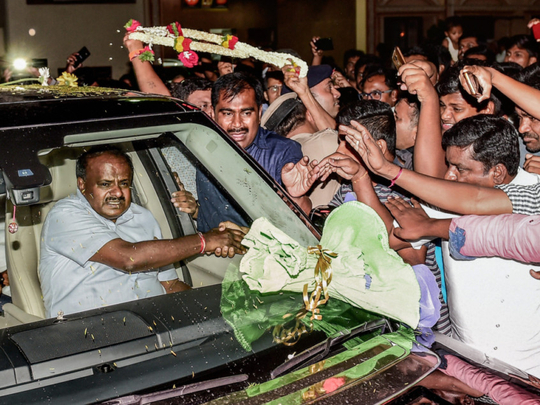
‘Are you sure we should go shopping today, Bengaluru’s top cop has invoked Section 144 till the election fiasco is over?” I asked my wife.
“We are not going near the Vidhana Soudha [seat of Karnataka’s State Legislature, built in an impressive neo-Dravidian and Indo-Saracenic style]; but in the opposite direction, to Orion Mall,” she said.
The legislature was the venue of a political cliffhanger and was surrounded six deep by khaki-clad policemen, and overlooking all that tamasha (Hindi/Urdu word for ‘spectacle’) were scores of OB vans of TV channels, with dish antennas pointing to the skies.
The local assembly elections ended recently and the results were crucial as it would show which way the country was headed; towards an India where people would be free to express their opinion and live a life free from prejudice, or to an India where the rights of the people would be curtailed and they would be told how they should live.
It was a hard-fought election, but the Kannadigas (people of the Karnataka state) cannily did not give either of the party a majority and that had led to a stand-off and shenanigans by the politicians who had to grovel and try to bribe fellow politicos to come to their side.
It was at the legislative assembly that the BJP (Bharatiya Janata Party) had to prove its majority, the atmosphere was charged and it was uncertain what would happen if either party loses.
The Assembly in the capital Bengaluru, IT hub and Silicon Valley of India, was the city where it would be decided where the country was headed.
Our driver cheerfully announced just as we got stuck in a traffic jam on Hebbal Bridge, that 2,000 policemen have been deployed to maintain law and order.
Prohibitory orders
“What’s Section 144, anyway?” asked my wife, unfazed and determined to get her shopping done before we fly off for the summer holidays.
I looked up Google: “It is a prohibitory order. No group more than five people can be seen on the streets. If you are caught assembling, the jail term is three years. It was invoked by the Brit rulers to stop nationalists from protesting. It is a controversial law as it should have been scrapped or changed after Independence,” I said.
“You should buy comfortable shoes, we will be doing a lot of walking,” said my wife.
“If we are still alive,” I said under my breath, wondering whether the driver’s skills would get us out of a riot situation, or whether he would leave me struggling with the gear shift, while he ran down the street.
Weeks earlier politicos had come to our gated community, telling us why we should vote for them. Our housekeeper said she was given Rs1,000 (about Dh53) to stand in front of a poll booth, hand over jasmine floral wrist garlands to people and urge them to vote. She asked us when we were voting, and when I told her we are not allowed to vote, she looked at me puzzled.
“We are not exactly Indians,” I told our housemaid, confusing her even more. (Our OCI, Overseas Citizen of India, status gives us all privileges, except voting rights).
There are millions of Indian expats in the Middle East and only last year were told they could vote but only by proxy, that is give permission to someone in their constituencies back home, to vote on their behalf.
The ‘floor test’, where the majority party had to prove it has the largest number of MLAs (members of legislative assembly) with it, was decided at 4pm when we were in the mall.
It was the driver who gave us the news when we came out that there was a new chief minister. “The streets are quiet,” he said.
Mahmood Saberi is a storyteller and blogger based in Bengaluru, India. Twitter: @mahmood_saberi.








